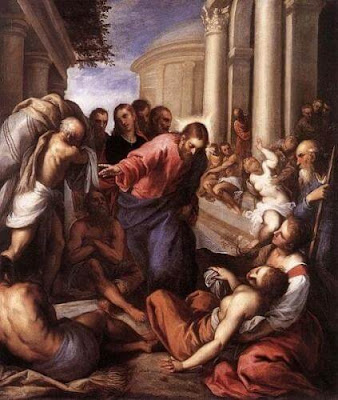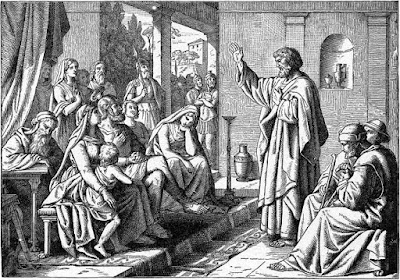Now Thomas, called the Twin, one of the twelve, was not with them when Jesus came. The other disciples therefore said to him, “We have seen the Lord.” So he said to them, “Unless I see in His hands the print of the nails, and put my finger into the print of the nails, and put my hand into His side, I will not believe.” And after eight days His disciples were again inside, and Thomas with them. Jesus came, the doors being shut, and stood in the midst, and said, “Peace to you!” Then He said to Thomas, “Reach your finger here, and look at My hands; and reach your hand here, and put it into My side. Do not be unbelieving, but believing.” And Thomas answered and said to Him, “My Lord and my God!” Jesus said to him, “Thomas, because you have seen Me, you have believed. Blessed are those who have not seen and yet have believed.” (John 20:24–29)
The Apostle, also, writing to the Ephesians, says that God hath purposed in Himself, in the dispensation of the fullness of time, to draw back all things in Christ to the head—that is, to the beginning—that are in Heaven and on earth in Him. In this same way the Lord applied to Himself two Greek letters, the first and the last, as figures of the beginning and the end which are united in himself. For just as Alpha continues on until it reaches Omega and Omega completes the cycle back again to Alpha, so He meant to show us that in Him is found the course of all things from the beginning to the end and from the end back to the beginning, so that every divine dispensation should end in Him through whom it first began, that is, in the Word of God made flesh. Accordingly, it should also end in the selfsame manner in which it first began.
Tertullian, On Monogamy 5
You have heard the Lord praise those who do not see and yet believe, more than those who see and believe, and were even able to touch. The apostle Thomas, you remember, wasn’t there when the Lord showed Himself to the disciples; and when he heard from them that Christ had risen, he said, Unless I put my hand in his side, I will not believe. So, what if the Lord had risen without His scars? Could he not, after all, have raised up His flesh in such a way that no traces of His wounds remained in it? Yes, He could have done that; but unless He kept the scars in His body, He wouldn’t heal the wounds in our hearts. He was touched, and recognized. It was little enough for the man to see with his eyes, he wanted to believe with his fingers. Come, he said, put your fingers here; I didn’t remove all traces, I left something to help you believe; and see my side, and do not be incredulous, but believe.
But when He showed him that about which he had had his doubts, he exclaimed, My Lord and my God. He touched His flesh, he proclaimed His divinity. What did he touch? The body of Christ. Was the body of Christ the divinity of Christ? The divinity of Christ was the Word; the humanity of Christ was soul and flesh. Thomas couldn’t touch the soul, but he could perceive it, because the body which had been dead was moving about alive. But that Word is subject neither to change nor to contact, it neither regresses nor progresses, neither fails nor flourishes, because in the beginning was the Word, and the Word was with God, and the Word was God. That is what Thomas proclaimed; he touched the flesh, he invoked the Word, because the Word became flesh, and dwelt amongst us.
Augustine of Hippo, Sermons 145A
Behold, He is coming with clouds, and every eye will see Him, even they who pierced Him. And all the tribes of the earth will mourn because of Him. Even so, Amen. “I am the Alpha and the Omega, the Beginning and the End,” says the Lord, “who is and who was and who is to come, the Almighty.” … Then I turned to see the voice that spoke with me. And having turned I saw seven golden lampstands, and in the midst of the seven lampstands One like the Son of Man, clothed with a garment down to the feet and girded about the chest with a golden band. His head and hair were white like wool, as white as snow, and His eyes like a flame of fire; His feet were like fine brass, as if refined in a furnace, and His voice as the sound of many waters; He had in His right hand seven stars, out of His mouth went a sharp two-edged sword, and His countenance was like the sun shining in its strength. And when I saw Him, I fell at His feet as dead. But He laid His right hand on me, saying to me, “Do not be afraid; I am the First and the Last. I am He who lives, and was dead, and behold, I am alive forevermore. Amen. And I have the keys of Hades and of Death.” (Revelation 1:7–8, 12–18)
If neither Moses, therefore, nor Elijah, nor Ezekiel, all of whom saw many things of the heavenly regions, saw God, but saw the likeness of God’s glory and the prophecies of the future things, it is evident that the Father is invisible. Of Him the Lord, too, said, No one has ever seen God. But his Word, just as He willed and for the benefit of those who saw, revealed the Father’s glory and unfolded the economies. This, too, the Lord said, The Only-begotten God who is in the bosom of the Father, He has made him known. … John, too, the Lord’s disciple, saw, in the Apocalypse, the priestly and glorious coming of his reign. Then I turned to see the voice that was speaking to me,…. Now, among these things he points out first the glory from the Father, as the head, and the priestly feature, as the long robes;—for this reason Moses vested the high priest according to this type—second, the end as the bronze refined in the fire, which denotes the firmness of faith and perseverance in prayers on account of the refining fire that will come at the end of time. … Thus the Word of God always possessed something resembling sketches of things to be done by Himself, and He showed to men something resembling a form of the Father’s economies, teaching us about the things of God.
Irenaeus of Lyons, Against Heresies 4.20.11










